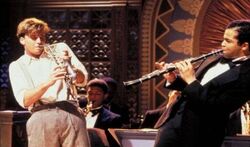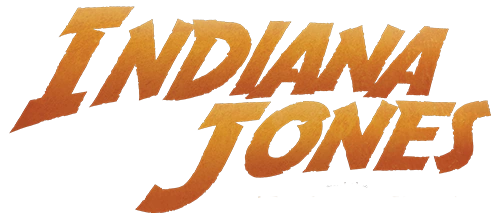Tag: sourceedit |
|||
| Line 9: | Line 9: | ||
==Appearances== |
==Appearances== |
||
| + | *''[[The Mata Hari Affair]]'' {{Mo}} |
||
*{{YIJC|Young Indiana Jones and the Mystery of the Blues}} {{Edited Into}} ''[[Mystery of the Blues]]'' |
*{{YIJC|Young Indiana Jones and the Mystery of the Blues}} {{Edited Into}} ''[[Mystery of the Blues]]'' |
||
*''[[Indiana Jones and the Peril at Delphi]]'' |
*''[[Indiana Jones and the Peril at Delphi]]'' |
||
Revision as of 16:03, 24 April 2019

Indiana Jones and Sidney Bechet playing jazz.
Jazz is a style of music developed in the United States of America in the early twentieth century. Started in the African American community in the south, it is a combination of African and European music styles. Jazz is highlighted by improvisation, syncopation, and the use of blue notes. Reaching its popularity in the US between 1920 and 1960, jazz was strongly influential on the development of blues and rock and roll. Jazz also became popular in Europe in the 1930s and 40s. Instruments commonly used in jazz music include saxophones, trumpets, clarinets, trombones, pianos, and vocals.
Adventures in jazz
When Indiana Jones was twelve, his father took him to New Orleans, where young Jones heard some of the early jazz masters, like King Oliver play.[1]
By 1920, jazz had spread to Chicago's clubs and speakeasies, and Jones, then a student at University of Chicago, worked as a waiter in order to hear live jazz music. He befriended Sidney Bechet, who taught him the basics of jazz, and loaned him a soprano saxophone to practice with. Bechet also took Jones to see some of the other great jazz musicians, like Louis Armstrong and Oscar Celestin, bending some of the norms of racially segregated Chicago to do so. Jones learned that not everyone appreciated jazz when he jammed out at a fraternity party with their band, and was forced to leave after playing supposed "brothel music". Jones continued to practice, but couldn't quite learn the jazz style until Bechet got him to practice one simple song, "Twinkle Twinkle Little Star" over and over. Eventually, Jones mastered it and felt the jazz in him, and was even invited to perform with Bechet on stage with his one song.[1]
Appearances
- The Mata Hari Affair (Mentioned only)
- The Young Indiana Jones Chronicles – "Young Indiana Jones and the Mystery of the Blues" → Mystery of the Blues
- Indiana Jones and the Peril at Delphi
- Indiana Jones and the Dinosaur Eggs
- Indiana Jones Adventure World (Mentioned only)
Sources
- Indiana Jones and the Lands of Adventure
- Indiana Jones and the Sky Pirates and Other Tales
- Jazz - Rhythms of Freedom (Non-fiction source)
- Louis Armstrong - Ambassador of Jazz (Non-fiction source)
